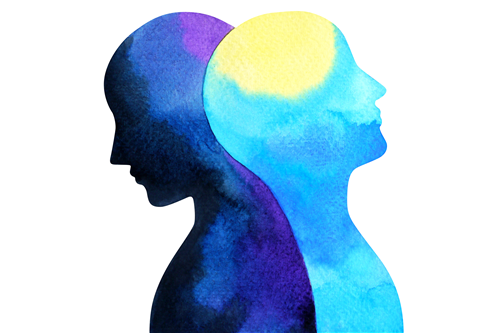Bipolar Disorder: Helping Those We Love by Disproving Myths

Of the many harmful stigmas associated with mental illness, few have been as incorrectly portrayed and glamorized in pop culture as bipolar disorder, also known as manic depression. This continual misinformation perpetuates a false narrative of how this disorder manifests and affects those who have been diagnosed. As a result, these myths and misconceptions place an undue and unnecessary burden on those living with the condition to educate those who have been misinformed. It often forces them to be subjected to criticism, scrutiny and skepticism by friends and loved ones when their symptoms don’t align themselves with what is so often (incorrectly) portrayed in television, literature and film.
To many, bipolar disorder means someone suffering from volatility, unpredictability and mood swings. Yet, bipolar disorder involves and encompasses so much more than someone with poor emotional control. For starters, the very term “mood swings” minimizes and undermines the severity of the periods of extreme highs and lows associated with bipolar disorder. These distinct cycles of manic highs and depressive lows can be devastating, isolating and exhausting. These changes in behaviors are often not as immediate as frequently portrayed (switching from a manic high to a depressive low multiple times a day is extremely rare and often indicative of another mental health condition) and tend to last days or weeks at a time. Not only do these highs and lows affect a person’s mood, but their energy levels, physical health and, in some extreme cases, their ability to carry out daily tasks.
Bipolar disorder is difficult to diagnose and can often get overlooked or confused with other mental illnesses. Since bipolar disorder tends to worsen without treatment, it’s important to learn what the symptoms really look like as well as the myths and facts associated with the disorder. Below are the 4 common myths and facts associated with bipolar disorder.
- Myth: All people with bipolar disorder are the same.
- Fact: We are all different, and as such, our experiences and reactions are unique. The manner in which bipolar disorder is manifested in diverse individuals varies and so do the symptoms and their extent. Only a small percentage of people with bipolar disease will experience what is called rapid cycling. In rapid cycling, a person with the disorder experiences four or more episodes of mania or depression in one year. Additionally, more than one type of bipolar disorder exists. There are two main types of the disease: bipolar I and II.
- Bipolar I disorder: Periods of severe mania and depression.
- Bipolar II disorder: Involves less severe “hypomanic episodes” but can still have periods of severe depression.
- Myth: Bipolar disorder is rare.
- Fact: Successful people like Demi Lovato, Russel Brand and Catherine Zeta Jones all have Bipolar Disease in common, and it is far more present in our society than we know. It’s estimated that up to 2.1% of the population will experience bipolar disorder in their lifetime. Rates of bipolar disorder are relatively equal between men and women, however, the prevalence of bipolar disorder may vary based on individual characteristics. For example, a diagnosis of bipolar disorder may be greater among:
- Native American communities
- People with lower education levels or socioeconomic status
- People who were previously married
- Young and middle-aged people
- Myth: Bipolar disorder can be cured through diet and lifestyle changes.
- Fact: Bipolar disorder is a lifelong illness for which there is currently no cure. It can, however, be well-managed with medication and various forms therapy, Furthermore, stress coping practices, regulated sleep and exercise have been shown to reduce episodes.
- Myth: There's no way to control symptoms of bipolar disorder.
- Fact: Whilst there may not be an official cure, there are many effective ways to manage this illness. Some types of medications can work very well. Besides medication, different forms of counseling can also help keep symptoms in check. Your healthcare provider may suggest medications such as:
- Mood stabilizers
- Antidepressants
- Anti-mania drugs
